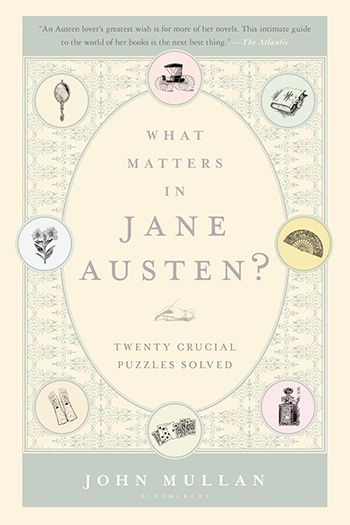Years ago, I was flipping through TV channels and came across Hugh Laurie, of Dr. House fame, decked out in 19th-century English gentleman garb. Because I was a House fan, I was curious about what Hugh Laurie sounded like with his native British accent, so I paused my channel surfing to find out. Then I brought up the title and saw that I was watching Sense and Sensibility. "Ugh. Jane Austen. No way I would enjoy that," I thought. I associated Jane Austen with foo-fooey lady stuff. So my plan was to flip the channel as soon as I heard Dr. House talk British. Two hours later, the end credits for Sense and Sensibility scrolled down the screen. I had watched the entire thing. Didn't even get up to go the bathroom. Not only did I watch the whole movie, I remember thinking, "Man, that was really good." Thanks to Dr. House, my resistance to Austen was broken, and I found myself genuinely curious about her books. So I got the free version of her collected works and slowly started working my way through what are arguably her three best: Sense and Sensibility, Pride and Prejudice, and Emma. And I'll be darned if I didn't truly enjoy them all. If you're a dude who's written off Jane Austen's work as I once did, perhaps today's podcast will convince you that there's something in it for women and men alike and encourage you to give her novels a try. My guest is John Mullan, a professor of English and the author of What Matters in Jane Austen? John and I discuss the literary innovation Austen pioneered that influenced the likes of Larry McMurtry's Lonesome Dove and will give your social agility a healthy workout. John then explains why soldiers and Winston Churchill turned to Austen during the world wars. We also discuss the philosopher Alasdair MacIntyre's argument that Austen's work was "the last great representative of the classical tradition of virtues," Austen's idea of manliness, and how a man's choice of a wife will shape his character. And John shares his recommendation for which Austen novel men should read first.
Years ago, I was flipping through TV channels and came across Hugh Laurie, of Dr. House fame, decked out in 19th-century English gentleman garb. Because I was a House fan, I was curious about what Hugh Laurie sounded like with his native British accent, so I paused my channel surfing to find out.
Then I brought up the title and saw that I was watching Sense and Sensibility. "Ugh. Jane Austen. No way I would enjoy that," I thought. I associated Jane Austen with foo-fooey lady stuff. So my plan was to flip the channel as soon as I heard Dr. House talk British.
Two hours later, the end credits for Sense and Sensibility scrolled down the screen. I had watched the entire thing. Didn't even get up to go the bathroom.
Not only did I watch the whole movie, I remember thinking, "Man, that was really good."
Thanks to Dr. House, my resistance to Austen was broken, and I found myself genuinely curious about her books. So I got the free version of her collected works and slowly started working my way through what are arguably her three best: Sense and Sensibility, Pride and Prejudice, and Emma. And I'll be darned if I didn't truly enjoy them all.
If you're a dude who's written off Jane Austen's work as I once did, perhaps today's podcast will convince you that there's something in it for women and men alike and encourage you to give her novels a try. My guest is John Mullan, a professor of English and the author of What Matters in Jane Austen? John and I discuss the literary innovation Austen pioneered that influenced the likes of Larry McMurtry's Lonesome Dove and will give your social agility a healthy workout. John then explains why soldiers and Winston Churchill turned to Austen during the world wars. We also discuss the philosopher Alasdair MacIntyre's argument that Austen's work was "the last great representative of the classical tradition of virtues," Austen's idea of manliness, and how a man's choice of a wife will shape his character. And John shares his recommendation for which Austen novel men should read first.




